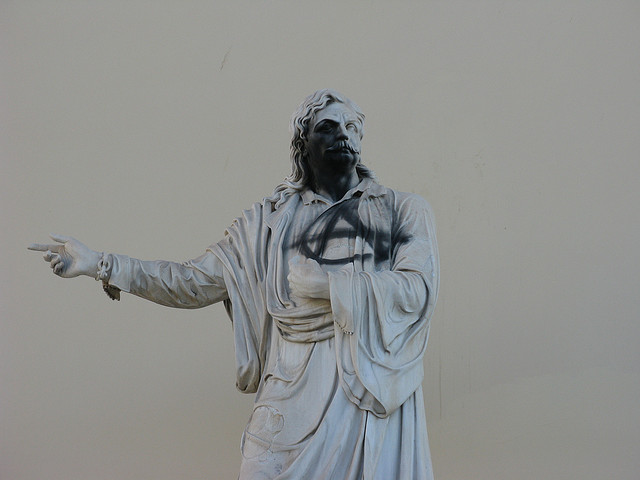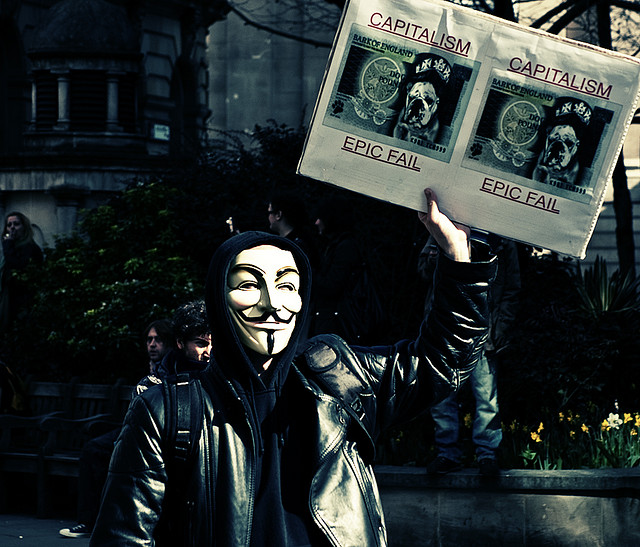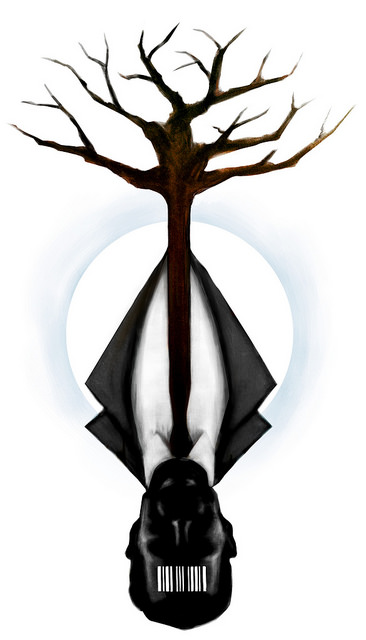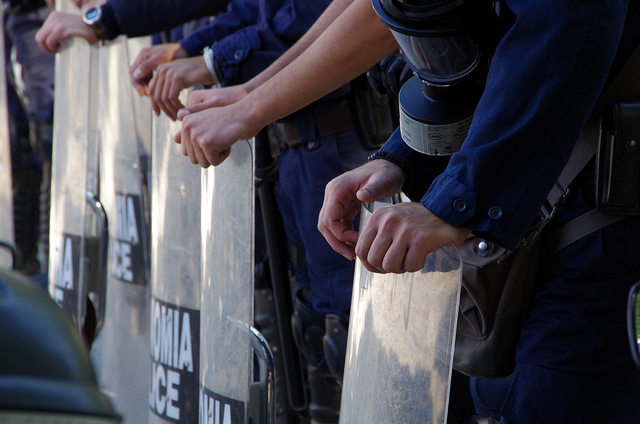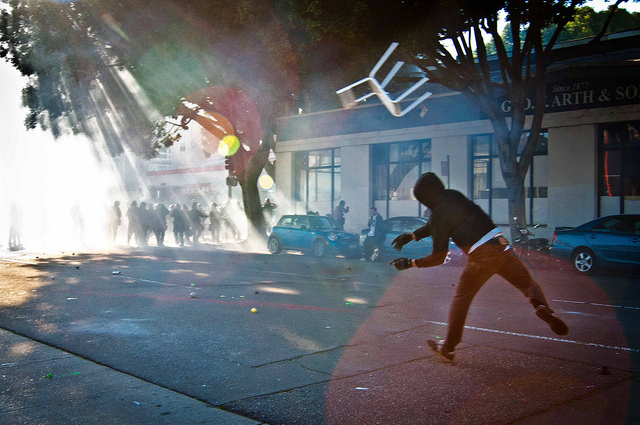|
|||||||||||||
The Philosopher Between the Capitalist and the Communist Chapter 39 : The Last Dissident of Militarism By Punkerslut
"Roz, I need to find you," the Philosopher mumbled to himself, dashing through the woods and its forest air. "Where can I find that Militarist and Fighting Tradition in these Bushes and Bogs? Where would you find someone who believed in killing the enemy as the most honorable act?" "Probably where you can continue to live like that without much distress holding you back," the Philosopher continued thinking, "A fort. The so-called homebase theory of Revolution. I wouldn't doubt that he's floating through the vapor of canals and ravines, fading into forests and melting into mountains, but at a time like this, when the tides are rising and the sun is glaring, I'd expect to find Roz in the closest thing to a throne -- a fortress." Alone with the unexplored expanse of earthen scenery, the Philosopher paid close attention to any caution that would be given to either his eyes or ears. These were areas regularly patrolled by anti-Anarchist troops. Discovering someone in an area like this without an explanation was basically the same thing as being discovered as an Anarchist. The Philosopher watched the grains in the wood and listened to the greens in the moss, navigating his destination and circumventing his enemy's location. The dust filled the room with the pounding of the artillery, the vibrations of shaking planks of wood and rumbling pillars of stone sending vibrations through the heart and body of every Anarchist soldier. One soldier, a bit more confident and able-minded than the others, quietly approaches a narrow gap that the Anarchists had been using to pinpoint enemy locations. "There's more artillery on the way, I can see them coming down the mountain. We're not going to be able to simply route them and push them back into the forests before they disperse into vulnerable, scattering bands of cowards. Our options are a bit more limited now, especially with our reduced manpower." These were the last days of Roz. "We will hold them off, we always have, we always will, and we have to," another Anarchist fighter added in. "They're coming, the regiments from the gully are moving," Roz didn't turn from the eyelet to the world, "Quick, sharpshooters to the second floor! The rest of us are going to cover you from our first floor defensive positions as best as we can. You'll have the best shot, but you also might be their best shot. Every type of suppressing fire will be used. Now hurry! We don't have time!" A mass of screaming people, tumbling legs and swinging arms, fidgeting hands and shrieking voices, the Anarchist fortress burst into activity and purpose. Every window became an opportunity to eliminate one of authority's obedient little pawns, every action became a risk of death by the most murderous means. It wasn't safe to take a shot from any point in the fort, but it wasn't even safe to breathe, either. When the assault finally hit, it was Roz who kept reminding the troops of these facts. "I can find you, I know I can," the Philosopher mumbles in his mind, "Somewhere in between the shadows of the trees and the dark underbellies of the leaves, in between the floating specks of dirt and the thick humidity of the air, in between the thundering of storms and the crashing of earthquakes, in between the suffering of the weak and the resistance of the angry, in between the act of really dying and the moment of really living, I know I can find you. Your heart is constantly boiling in the ocean that is your rebellious personality. "You made it through the academy, you made it through the officer corps, you made it through the campaigns of the Great War, you made it through screaming crowds of well-disciplined soldiers each trying to rip the blood out of your body, you made it through the deepest sands and the tallest mountains, the densest woods and the driest deserts, you made it through the personal and petty bickering of kings and the huddled clutterings of snobbish, social elites, you made it through everything, up and down -- you obeyed every single step of the way, but beneath all of that, I know who you really are -- I know that you were always just waiting to revolt, gathering your patience, building your confidence, consolidating your emotional and intellectual powers. All that time you had existed on the outside as a respectable person, but always brewing on the inside, you were ready to overturn everything cruel and rotten in their miserable system. If there is one person I will be able to find in this maze of human bodies between me and the end of the world, you are the one. I will find you, Roz." The Philosopher grabbed a tree branch on his way down a sloping hill, using the momentum to swing him forward, "I know you too well, Roz. I know exactly where to find someone like you." In the downward slope, he hops over a large stone that appears in his way without losing his thoughts or his concentration. "What would the Philosopher do at a time like this, when the winds are pouring hard and the winds are beating mercilessly -- when the clouds seem to sheath the last sliver of hope out of the sun and the trees bow down before the turbulence in the air? What would that great mind think up to get away from all this misery, servitude, and death? How would brilliance find its escape from slavery? There must have been some secret trick, some handle behind this wall of reality, that lets you grab everything in your hand, pick it up, and put it back down the way you want it. When the skies growl, the earth shakes, and all wild animals take flight -- when the beating of terror in my heart has knocked every thought out of my head -- when torrential rains and high floods threaten to wash away everything around me, there is always that hope, that just maybe, somewhere, there is some hidden door that will take me far away from here." "The regiments are falling back!" one soldier reported. "Quick!" Roz shouted, "Send the assault teams to cut their heels as they run. If they're giving us an opportunity to cut them in half, ignoring it would make us guilty of bad tactics. Send the most hardened and aggressive soldiers in first, and make sure they are equipped with the deadliest weapons. Since the enemy is fleeing and we're in a defensive position, a bare minimum of weaponry for us defenders is enough to eliminate any enemy scouts patrolling the area and to successfully withstand any moderate assault." The soldiers looked to Roz, some of them exchanged glances with expressions of the utmost firmness, and finally, they all nodded and agreed. The fortress burst into a frenzy of activity, just before the frenzy of blood. Behind the ferocious swinging force that resounded from his bow, Roz gazed the tremble and fear of the enemies as they fled, leaving behind their wounded and dead, their weapons and their ammunition, their equipment and their rations. "Faster, faster," Roz grumbled to himself, "They are only begging us to kill them. They've allowed themselves to be put into such a weak and vulnerable position, that it would be taking advantage of our honor to expect any mercy from us." Some of the soldiers heard this, making them pause and think, and the only reason why it did not attract Roz's attention was because he was too focused on the retreat to be aware of the thoughts of his nearest troops.
"Hey, hold your firing!" a voice shrieked, catching Roz by surprise, and then another voice, "Someone's out there waving a black flag!" ~ "Look in the trenches, the black flag!" ~ "Who's waving a black flag on the side of the Statists?" ~ "It's just a trick, they want to lure us into a false sense of security!" ~ "Someone look close at the fabric; is that the stitching you'd find in the old mills at Anarchia?" There were thousands of bodies in that fortress, but there were also thousands of minds. Every possible thought was considered, every action under the community's discretion was extremely analyzed. These were fighting men and women, and they were fighting with one of the world's most well-known Militarist of all times; they knew this, but the numerous masses of them did not forget that they were Anarchists. "Nobody fire a shot on that black flag unless it fires a shot at you!" Roz's screamed echoed through the fortress, "And besides, it just one goddamned flagwaver. We've got more than fifty units within visibility on our Western flank just begging for arrows in their guts. You should be fulfilling your spirit of anti-authoritarianism by cutting them down rather than arguing with each other about the meaning of one man waving a black flag." The entire spirit of the fortress had calmed, but there was still fervent whispering and curious glances. After the shouts and screams had quieted, the tatters of black cloth still kept dancing in the airs just outside the fort, this constant distraction, until it finally stopped completely. Out of the trench, one could see the head of a hooded man slowly emerge and expose himself to the view of the First Anarchist Army. It was the Philosopher. "Don't fire a shot!" Roz screamed, "That man is our friend! Quickly, get him inside!" As troops rushed to the multiple-bolted door and signaled the old man to come inside, Roz continued, "Make sure he enters unharmed! Kill any Statist that you see within one hundred meters of him! And don't do a single possible thing that could harm him!" After a number of times where the soldiers and the Philosopher exchanged glances and hand suggestions, an old man in a hood huddled across the battle field while keeping his head down at near-waist height the whole time, ducking across that millpond of ferocious hornets and horseflies. In the quiet of a battle between the Anarchists and the Statists, the Philosopher had entered the last battlehold of Anarchy. "I didn't think I was ever going to see you again," Roz said upon greeting the stranger. "I go where I'm needed," the Philosopher smiled, "I thought that maybe we could talk a little bit." "Talk, sure!" Roz said, "I haven't seen an amiable personality in... in..." A thought of Pan comes across his mind, and he changes the subject, "What is it that you wanted to talk about?" "You can't survive here," the Philosopher said, "There are endless miles of soldiery on their here to destroy every last grain of grass they can find." "The only ones who are fighting so that they can live to breathe freely -- we are the ones who are doomed, when assaulted upon by those who fight to get their next pay bump or to avoid the lashings and punishments that come from retreat? We're the ones who can't survive?" Roz's attitude became a little more incensed. "The dust and confusion of war is like that," the Philosopher replied, "It can easily blow up into your face and eyes and nostrils and leave you completely incapable of truly evaluating your situation." "But somehow you escaped the dust," Roz said, "Leaving you and only you with the senses to know who will live and who will die?" "You can't keep playing this game of running into the woods or the mountains whenever enemies fall down upon your wheat fields because you didn't have the labor force to build walls, since they were all busy just trying to feed themselves," the Philosopher said, "The contortions you perform to outwit a superior force of numbers are truly amazing, but it is one kind of fight when a weaker person manipulates a stronger person to their will -- it isn't even a fight at all, though, when it is a weaker person facing ten stronger people. If you stay here, you'll be dead; if you retreat further into the woods away from your wheat fields, you'll be dead; if you surrender and ask for forgiveness, you'll be dead. You have no choice. Don't try to tell the wind in what direction to blow." "I never wanted to command the wind," Roz said, "I only wanted to give it my advice, and let it choose what it wants. But I'm the person who just happens to have the temperament where I become extremely depressed and disappointed when the wind ignores my suggestions." "So, you're not going to ignore the unignorable, are you?" the Philosopher said, and while Roz's eyes fell into the depths of his thoughts like a pebble falling into a deep well, the Philosopher continued, "I have transport ready and waiting, at a distance and in a safe location. I can save you and your troops, every last one, not a single one left behind --" But before he could say another word, "You think we need saving? You think that your transport at a safe distance is going to take us away from this entire world of Communist versus Capitalist, Statist versus Anarchist, and return me back to my post as an officer, and these troops back to their positions as mechanics, carpenters, factory workers, and farm laborers?"
"You're absolutely right about that," Roz said, "There is no undoing of one's self that doesn't leave the soul scarred and the heart functionless." "You'll be the one guilty of undoing yourself if you stay here," the Philosopher replied, "Then nobody's going to blame the Communist Army or the Capitalist Army. They're just going to say that you chose a really slow method for suicide, that there was nothing political at all about it, that the whole thing was entirely personal." "And maybe they'd be right," Roz replied. "Please, convince me otherwise," the Philosopher's expression turned dire. "I didn't know what the rebels were fighting for, but I knew who they were fighting against, and that was enough for me," Roz replied, [*1] "Sometimes, I still don't know what they're fighting. Some vague idea about how some vague thing should or shouldn't be accorded this right or that right or this privilege or that privilege. Words are the weapons of thinkers. But swords and arrows, those are the weapons of the actors. I simply don't belong to the world of Revolution versus the Established Order. Asking me to take a position and decide on matters that never belonged to me is like asking the birds to swim or the fish to fly, like asking the trees to give opinions on the stars and asking the rocks to give speeches about bugs. Two completely different forms of matter can coexist together for a very long time, even if they only exist in contradiction." *1. Quoted from "the Fall of Paris," by Alistair Horne, Chapter 7 "But not forever," the Philosopher said. "No, I guess not, maybe," Roz said, "I suppose the contradiction can sometimes swallow the situation." "Is there a situation that can overcome a lie?" the guardian of truth begged. "Truth fights for itself, so do I," Roz replied. "The truth doesn't fight for itself," the Philosopher replied, "It needs a very argumentative and crafty guardian to keep it safe from the purloins of this or that greater thinker who comes along." "Well, I fight for myself," Roz said, "You can protect truth all that you want, but me, nobody else will fight for me or for these soldiers surrounding me. I've got to do it." "You're going to die doing it," the Philosopher said. "I'm a Militarist, you know that," Roz rebuffed the comment, "Dying is part of the life." The blast of distant artillery is heard nearby, the slinging of the catapult echoing in the distance. Dust suddenly fills the room from the ceiling and the walls, as though the building itself was becoming exasperated under the pressure. "I can guarantee your safety," the Philosopher said. "And I can guarantee yours," Roz replied, "When you leave, because we won't be." A mild rouse of cheering followed for a few seconds in the background at these words.
"I do," Roz said, "Let's set up some sharpshooters to cover your escape. You did extremely well getting here, so leaving shouldn't be too difficult." "You really are making this decision?" the Philosopher asked. "Yes, I have to," Roz said, and with a quick examination of the clouds with his eyes, he added, "I've never met someone like you before, and I never will again. Guard truth for as long as you want, if that's really what you want." And like the dust that suddenly appeared and disappeared from the artillery firing, so too did the Philosopher escape from the scene. But he did not quite leave the area entirely. He watched as they dragged out Roz from the last Anarchist fortress, heavily chained and surrounded by an elite troop of Babylonian soldiers. He watched as he was marched toward an iron cage awaiting him in the enemy encampment. For a single moment, his head turned, and his eyes met with those of a hooded stranger in the deep of the woods. He turned away, as to not draw attention to the mysterious creature in the midsts of predators. With eyes to the ground, Roz smiled, and there was only a small amount of hesitation, before the Philosopher caught him mouthing those words from across the great distance of their bodies, "I'm sorry." Holding him by the arms, the guards carrying Roz threw him into a rusty, iron cage, the rays of light penetrating through the bars now his only brightness in life. Although appearing unhurt as he was marched to his cell, his body went limp as he struck against the floor of the crate. Pan's fate was sealed, Roz was a prisoner of the great empires, and the last few inches of Anarchist Rebellion were crushed. "But was it even still Anarchist at that point?" an old veteran complained when interviewed by his captors, "It may once have been Anarchist, at some point in time or some location on this planet. What it became, I don't know. I don't think any of us knew. I joined the Anarchists because I was tired of the conditions around me determining how I live, so I fought back against all authority, so that I would be the one who determined how I lived. And here I am, a confused and idealistic Anarchist, fighting to the bitter end, with my only friends being a Militarist and a Marxist -- the conditions surrounding me making decisions for me more than ever. I miss what we had in Anarchia. It may not have been perfect, like a paradise everyone agrees with everyone else all the time, but I was happy there. I never really trusted these swamps and bogs that we escaped to in the North East." Some Anarchists refused to let themselves be captured, and were killed only by brutal, aggressive, assault squads. Others, when taken hostage, covered in the blood of their comrades and their enemies, stern and complacent and orderly and obedient, turned into sobbing, tearful creatures once they were placed in shackles. Some said nothing, others couldn't stop talking, some took the pushing and shoving of their prisoners with acceptance, others fought back and suffered miserable tortures for it. One group of Anarchist prisoners was tied to a tree, but the smuggling of a metal file by one of them led their escape. Another group of Anarchist prisoners was marched out into an open plain, asked to sit on their knees without cramping their shackles, and were executed by a direct shot to their spines from an arrow. On this day, Anarchy ceased to exist. If it ever came into existence again, in the next few thousand years, it was only in momentary and uncertain moments, it was only through unexpected political alliances and an over-educated leadership that could never escape its wealthy upbringing. Hammurabi and Solon had eliminated Anarchy -- but there were still Anarchists out there. And at Babylon, in an iron cage, there was Roz. "Get up!" Hammurabi screamed, "I said get up!" Then, Hammurabi noticed, there wasn't a twinge or a blink or a response of any kind, even breathing itself had seemed to stop in Roz. But at that point, he realized: it wasn't Roz anymore. It was just the body of Roz. The man had disappeared permanently from the world. His relaxed posture was in contrast to the balled up fist he held out stretched. After prying deeply through those cold, tight fingers, Hammurabi had finally ripped out a tiny, metal object from that hand. Hammurabi rolled the tiny, metal capsule in his hand, noticing the imprint on the side, "Babylonian Military Academy, Class of 1848: Live Fighting, Die Quietly." Upon closer examination, he discovered that it was a standard-issued container -- for suicide pills, given only to the highest-ranking officer graduates, so that they wouldn't give up secrets if captured to be tortured by the enemy. "You rotten piece of garbage," Hammurabi spoke to the corpse, "We made you. Only we can destroy you. Taking away our last right while you use yours? Filth of the planet, you never should've been an officer! You deserved to have your last memories full of Anarchists and Anarchy!"
|

